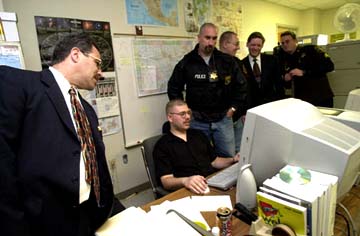|
From Scotland Yard To Wayne County, Michigan

Sherlock Holmes appeared in a total of 60 stories, written by Arthur Conan Doyle and published between 1887 and 1927. One
night, at the turn of the 20th Century, Consulting Detective Mr. Sherlock Holmes and his companion Dr John H. Watson left
their home at 221B Baker Street for a camping trip.
After a good meal and a bottle of wine, they lay down for
the night and were soon fast asleep. Some hours later, Holmes woke up and nudged his faithful friend,
"Watson,
look up and tell me what you see."
Watson replied, "I see millions and millions of stars."
Holmes asked, "What does that tell you?"
Watson pondered for a minute.
"Astronomically,
it tells me that there are millions of galaxies and potentially billions of planets.
Astrologically, I observe
that Saturn is in Leo.
Theologically, I can see that God is all-powerful and that we are small and insignificant.
Meteorologically, I suspect that we will have a beautiful day tomorrow.
Why, what does it tell
you?"
Holmes was silent for a minute and then spoke, "Watson, you idiot. Some jerk has stolen our tent."

One century later, the same challenge faces our Internet Crime Task Force. Similar to Sherlock Holmes, our Digital Crime Detectives
must have a sharp and shrewd instinct to see the forest beyond the trees.
Today, we have made more than felony
arrests of digital criminals than all the federal, state, and local agencies in the Midwest Region of the United States combined.
Why? Because we have looked beyond what is seen, read beyond what is written and heard beyond what is said.
In
the year 2001/2002 we are a society on the verge of a major transition. One hundred years from now, the impact of the Internet
may be viewed as altering to our culture as the development of the Model-T Automobile was to our fore fathers in the 20th
Century.


In the early 1900's police executives at Scotland Yard and elsewhere must have surely pondered if it would be worthwhile to
switch from horseback patrols to purchasing cars, after all drivers would have to be trained, gasoline would have to be continually
purchased, and parts would need constant upgrading. Our arrests must be viewed in the context that we have a car on the information
superhighway, while too many local law enforcement agencies are still patrolling on horseback.
Why should you
be concerned about local law enforcement's ability to capture digital criminals? Why you should hi-tech industry ensure that
the Internet is a secure environment to do e-business transactions and also safe place for children to get homework help.
Policing the Internet is an adventurous task at this point in time. The digital criminals outnumber
the Hi-Tech Cops by at least 100 to 1; they have faster and better equipment, along with well-hidden underground networks
for illegal activities. They believe that they are untouchable. We are in a time that must be similar to being a Sheriff of
a stagecoach town in the Wild West.
Our children may little remember party line telephones and grandparents may
have little understanding of Internet chat rooms. Prior technological advances - the automobile, the telegraph, and the telephone,
- have brought dramatic improvements for society, but have also created new opportunities for wrongdoing. The same is true
of the Internet, which provides unparalleled opportunities for socially beneficial endeavors - such as education, research,
commerce, and entertainment - in ways that we may not be able to imagine. Individuals who wish to use a computer as a tool
to facilitate unlawful activity may find that the Internet provides a vast, inexpensive, and potentially anonymous way to
commit unlawful acts, such as fraud, the sale or distribution of child pornography, the sale of guns or drugs or other regulated
substances and the unlawful distribution of computer software or other creative material protected by intellectual property
rights.
As computers and computer networks gain in power and speed, they are becoming central to the lives of
larger numbers of people, including larger numbers of digital criminals.
What can be done to unite Hi-Tech investigators,
parents, educators, and corporate computer security experts to stay steps ahead of the digital criminals? That is the question
that must begin our dialogue. Digital criminals aren't going away; they will become a greater problem in the future. Certainly,
by now, we know the dangers of opening executable e-mail attachments sent by persons unknown to us. So why do people still
do it? No technology can protect us from our human failings.
|

